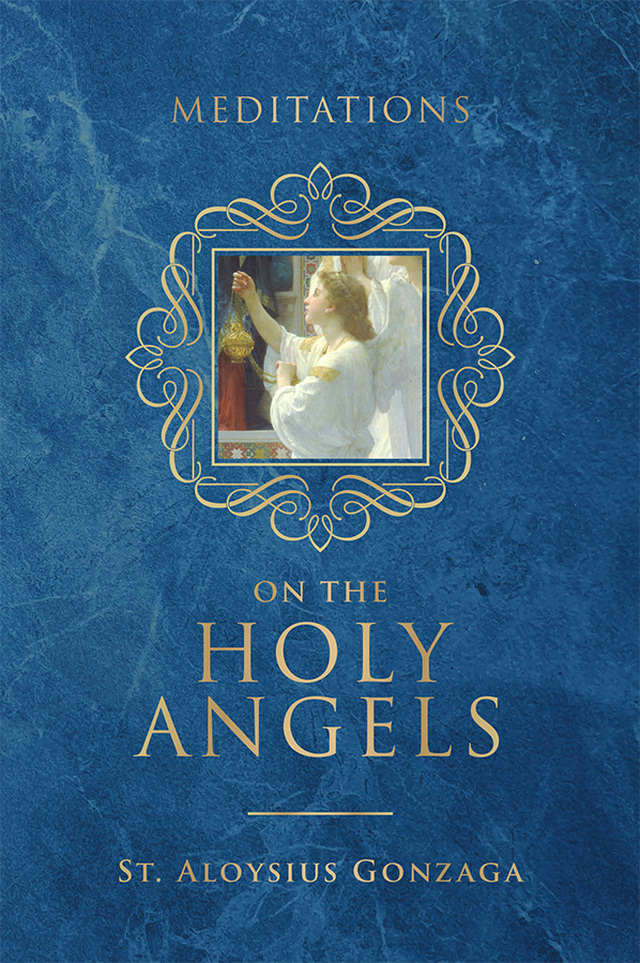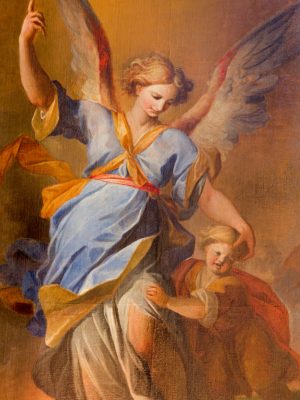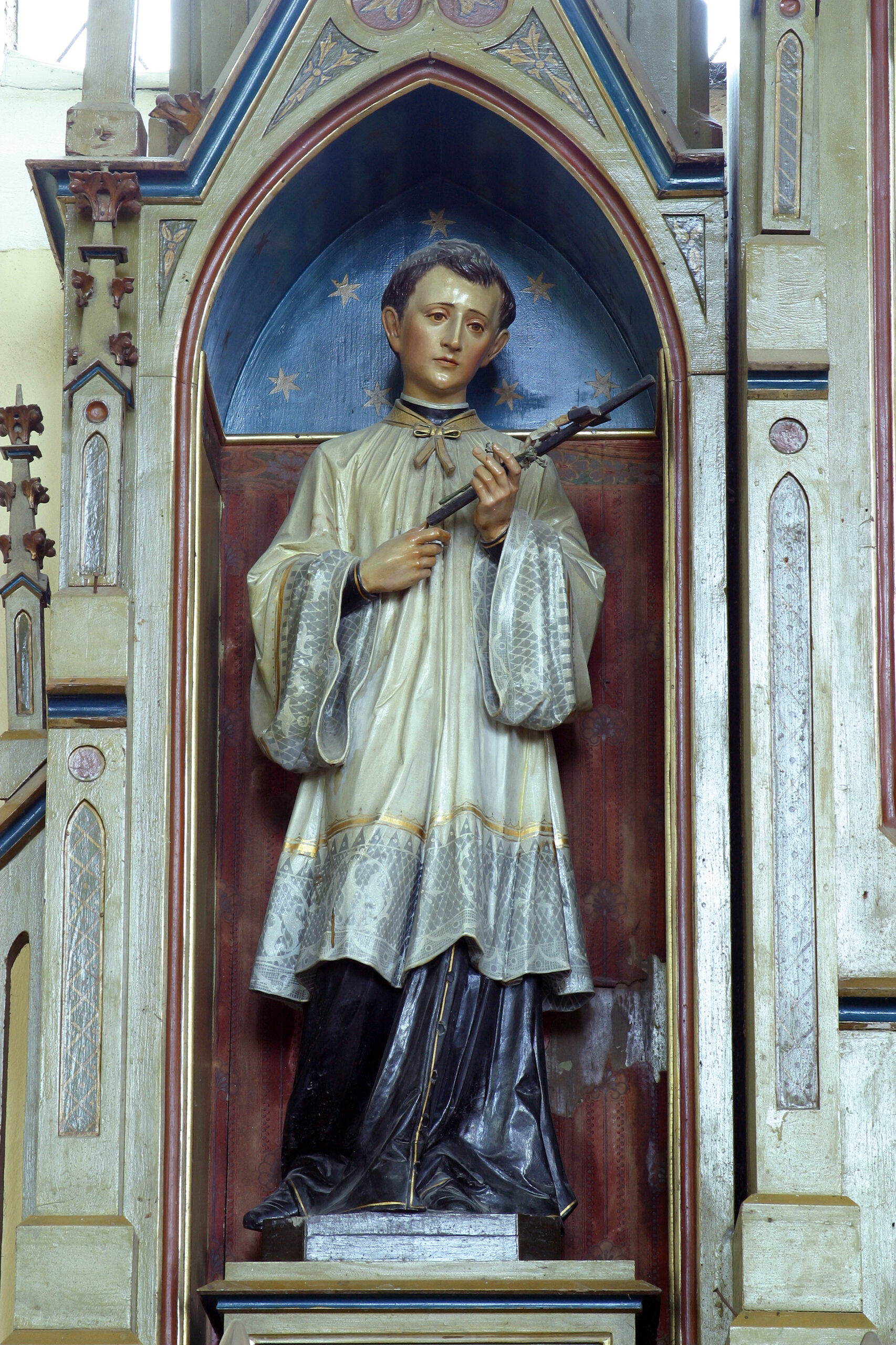From Speculum Innocentiae: Sive Vita Angelici Juvenis B. Aloysii Gonzagae (The Mirror of Innocence: or The Life of the Angelic Youth, Aloysius Gonzaga) by Babriel Hevenesis (1717)
The tender affection which Aloysius possessed for his guardian angel constantly increased as the holy youth advanced in age and maturity. Three times each and every day, he would devoutly commend himself to the protection of his guardian angel. Inspired by a desire to promote the love of, and devotion towards, one’s guardian angel, he once wrote, “Be certain that you have in your guardian angel a trustworthy leader, whom it behooves you to follow!
Let whoever is blind, whoever is uncertain of their journey and its peril similarly trust in their angel with confidence and faith, for it is the providence of almighty God which assigns and directs this angelic protector.” Once Aloysius had entered adolescence, he wrote a beautiful set of meditations upon these angelic spirits, which were published and merited much warm praise and sincere approbation.
Never are these celestial guardians venerated in vain, and they always respond favorably to the piety exhibited towards them! For the angel who protected the saintly Aloysius never permitted his care nor his love to be lacking, even for a moment. This spiritual being returned many benefits to the youth for the veneration and piety which he nurtured towards him and spared him from many of the perils and hazards of this mortal life, as his own special protégé. It will be edifying to consider a few particular instances of this.
His father, the Marquis of Castiglione delle Stiviere, was a most heroic and courageous soldier. Bravely fighting for his most Catholic monarch, he had earned for himself great honor and renown by his outstanding deeds at arms. And just as many parents desire their offspring to follow in their own footsteps, so he wished to impart to young Aloysius the same military skills which he possessed so abundantly.
Accordingly, before the boy had reached the age of four, he taught him to use miniature cannons, swords, and many other weapons specially made for the use of one of his small size. Not long after this, he took his young son into a real battle, having carefully clad him in a little suit of armor. He then commanded Aloysius, holding aloft a flag tied to a small lance, to lead the troops as they marched forth.
At this time, the future saint did not fully understand what was taking place. Naturally enough, it all seemed to him like a piece of exciting playacting, and he took great pleasure in his role. But then the enemy suddenly fell upon them, and he soon realized that it was not playacting at all but that his life was in real peril. As Aloysius fired his own small musket to defend himself and ward off the foe, the burning gunpowder and scorching heat which were released wounded his delicate face.
In the chaos which surrounded him, he was entirely destitute of any human help. Pushed to and fro by the battle and the force of the discharging cannons, he fell backwards onto the ground. And as he did so, the wheel of a heavy carriage drew near where his head lay. His skull would certainly have been crushed, but—lo!—just at that moment, his guardian angel stopped the rushing wheel and saved the life of the pious boy from what was otherwise certain death.
O my reader, consider how many times in this life perils would have overcome you had your guardian angel not solicitously turned them away! Indeed, since you have survived to this day, it is certain that your guardian angel has done this already a vast multitude of times, the majority of which are wholly unknown to you. For each time you take a step on a slippery pavement, or mount a horse, or draw water from a well, you could very easily fall to your death by a single wrong step. And there are thousands of other instances in which death could easily befall you—by diseases, disasters, accidents, and misfortunes of every kind—unless your guardian angel were constantly protecting you.
And do you, for your part, offer this guardian angel of yours any reciprocal love or commensurate gratitude? This angel is constantly vigilant, both day and night, lest you should fall into any harm. Does it not therefore deserve at least one act of gratitude or veneration from you at least once a day? After all, you pay your servants their due wages, and you express polite appreciation for any gifts or services you receive.
But what recompense do you offer your guardian angel, who serves you more constantly and faithfully than any human servant? O reader, make a resolution with yourself today to show gratitude to your spiritual protector, and adhere to this resolution assiduously! Count any day on which you fail to offer thanks to your guardian angel to be a “lost day.” For you are always in need of the protection of this heavenly being, just as Saint Aloysius was always in need of his own.
Another instance of this occurred one day when Aloysius was crossing the Ticino River in his home region, riding upon a small horse-drawn carriage. Now at the time, it had been raining heavily, and the river was swollen and turbulent. As Aloysius passed over a flooded ford in the river, suddenly the force of the water swept his carriage away, taking him with it! It seemed almost certain that the life of the hapless youth would be lost in the swirling waves of the furious river. But, through the intervention of his guardian angel, the carriage was caught upon the trunk of a great tree, where it was held secure.
Thus the boy was able to escape being submerged in the waters and to wait there unharmed until rescuers arrived and returned him to the welcome safety of the dry land. On that occasion, it was water which menaced the life of Aloysius, but at another time, it was fire. For once he was afflicted with an illness and lay resting in his bed at night. Then it suddenly occurred to him that he had not yet said his daily prayers. So at once he called for a servant and ordered him to bring a lighted candle. He directed him to place the candle, in its stand, on his bed and then dismissed him. With his prayer book in hand, Aloysius was thus able to read his daily prayers, psalms, and meditations. Yet as he did so, he grew weary and fatigued, and sleep overtook him. But the lighted candle continued to burn down steadily until the bed sheets caught fire!
The voracious flames quickly enveloped these. And Aloysius, too, would certainly have been incinerated were it not for the timely intervention of his guardian angel. For this angel roused him from slumber just in time to flee from his burning bed, and so he escaped from the ravenous fire—his young life saved once more by his heavenly protector. Following the incidents related here, it was only natural that Aloysius should be inspired with a most fervent gratitude and devotion towards the holy angels, and in particular towards the spiritual entity who served him as his own special guardian and protector.
And, recognizing the Lord who created and commands these celestial beings, he endeavored always to do what was in conformity with the will of God, both in dealing with his own business and that of his father. And the hope he placed in God was not deceived or frustrated, for it is said of Aloysius that there was never anything which he requested in prayer—either small or great—which he did not obtain, and there was no business, however difficult or apparently desperate, which he commended to the Lord which did not come to pass precisely as he wished.
May our own trust in God be like that of Saint Aloysius! Let us place our hope and confidence in Him alone and not in the vain things of this world. For, truly, the one who places their hope in the things of this passing world—which all soon vanish as fleeting shadows—builds his house upon sand and wavers like a feeble reed in the wind. But, O reader, make God, together with the angels who serve Him, your protector and your help, and all shall surely go well for you!
Do you wish God to be merciful and generous towards you? You can do this very easily: for God is the protector of all those who sincerely cultivate innocence of heart. Truly, an unstained conscience is the best refuge of the soul in any peril, for it alone unfailingly secures the invincible protection and assistance of the high King of heaven, together with His whole host of holy angels!
This article is taken from a chapter in Meditations on the Holy Angels by St. Aloysius Gonzaga and translated by Fr. Robert Nixon, OSB which is available from TAN Books.









